- Home
- Colm Toibin
The South Page 9
The South Read online
Page 9
She wanted it to die, to lie still and die. It was the life in it which tore her. All night Miguel held her hand and she whispered to him that she wanted the child to die.
The night would not end. When she asked what time it was they told her it was three in the morning. She asked the midwife what time the child would come, and the midwife said it was difficult, it could take a long time.
“Am I going to die?” she said in English. It had not occurred to her before, but when she looked at the midwife’s face, it struck her, it struck her that she was going to die and the child was going to live.
“Miguel, Miguel!” she shouted as loudly as she could; he came bounding up the wooden stairs.
“Qué pasa? Qué pasa?”
“Me voy a morir? Me voy a morir?”
“No.”
“Seguro? Estás seguro?”
He did not move from the bed again. His denial that she would die did not reassure her; he had accepted her question as natural, had been too quick to answer it. The midwife wanted her to relax, but Katherine watched her eyes for some sign. The pain came back with the contractions. The baby would live, she knew, but the baby would kill her. And they would bury her as soon as they could, and the child would live. The child was too big not to kill her.
In the last few months as the baby grew bigger, she and Miguel had spent most of the time in bed together, wrapped up against the cold. In the few hours of daylight she covered herself up and went down to the workroom to draw and paint. She drew the room with a pencil and coloured in only what could be seen through the window, the wide white air, the mountains in the distance, odd rough stone buildings. She gave the room a spare domesticity by moving only a table against the wall and putting a few jugs on it and a chair beside it at an angle as though someone had just been sitting there. She made the room seem dark, sketchy and unfinished. She had done one or two of these a day on small sheets of white paper. That’s what would be left now, these small things drawn when she was happy, when there was energy to spare. Some people would know that they had been done in the months before she died.
She hardly remembered giving birth. She remembered very little once the midwife cut her with what she thought was scissors. She remembered that she cried. She remembered that Miguel held her hand and told her she was well.
Months later the scars and bitterness remained. She had not wanted a child; she was not prepared to go through such fear and agony. It had been easier when Richard was born, the midwife could not believe that this was her second child. And then they had presented the child to her, clean, swaddled, quiet. It was a girl, they told her as they put new sheets on her bed and took the other ones away, una noia. She had not wanted to be diverted thus into caring for a child, feeding the child, nursing it. She had not sought any of this. She could not tell anyone how much she believed the whole thing had diminished her.
She took the baby into her arms; she was tiny, a small shadow of black hair on her head. As the months went by she watched, amazed by the baby’s absolute trust, by the calm way the baby looked at her. It had not been like this when Richard was a baby. The baby smiled more when Miguel was there to play with her and make sounds and faces to amuse her.
Summer came around again. In front of the house the baby lay in a pram. Miguel wanted to call her Isona. They sat in easy chairs drinking wine in the afternoon. The hot sun shone down on the Pyrenees. Soon they would need to start getting wood in again for the winter.
A DIARY: 1957
Pallosa, 23 June 1957
This morning when I woke up I could hear Isona in the room downstairs. She was standing leaning against the bars of the cot, crying, and as soon as I came in she began to laugh. Her face lit up. She put her arms out to me and I picked her up. She was all wet. She kept laughing as I carried her into the kitchen. Sometimes it is wonderful having her here to trust me and to love me the way she does.
There is no one here who will understand how much at certain times she looks like my father, how a look comes on her face and she becomes the image of him. Richard had that too when he was her age, although they don’t look alike in any other way. We have removed her from a world where that sort of recognition means anything. We are her only roots, no one comes before us.
She will never know where she came from, where we came from, the accidents that have brought her into the world. I would love her to know the house I come from, the river, the farm. I would love it if we could all meet sometime, Richard, Tom, Miguel, Isona, Michael Graves. I would love to see Richard picking her up and carrying her. I’m afraid I have placed myself beyond all that.
Things are difficult with Miguel now. I had a nightmare. I woke in the night, still screaming, I couldn’t stop the dream, even though I was wide awake and Miguel was holding me, it stayed on and I was afraid to sleep it was so real and close, I believed it would start happening again.
I dreamed about the fire. I dreamed about being led down through the long corridors of the big old house, a man behind me, guiding me along, with all the rooms on fire and the corridor running on and on until we came to the stairs. I could feel his hand on my neck guiding me. The dream was as real to me as being here now in the kitchen after dinner and the pen in my hand.
When we got to the door we couldn’t get out, there were men waiting outside for us and one of the men was Miguel. They had guns. He had a gun and he was shooting at me. I feel afraid again as I write this down, it was so bad. It was ghastly. I don’t know who it was behind me but when I woke up I thought it was Tom. I woke up when the bottom of my nightdress caught fire. I couldn’t believe the fire had stopped, even though Miguel kept telling me that I was fine, that there was nothing to worry about.
I told him about the dream. I told him things I had not told him before. I told him about the men setting fire to the house in Enniscorthy and about us running out in our bare feet in the middle of the night. I had not told him any of this before. He understood. He asked me questions about Ireland and about Irish politics, but I only knew that this had happened to us and to others like us before the British left.
He was puzzled by this new context he had for me, as though I was some sort of victim of history. Not a victim, perhaps, but a participant. I have failed to explain to him that I am not. I am on my own here without all that weight of history and I differ from him in the way I manage. He’s decided I am someone who was on the wrong side of a war. I am sorry I told him anything. I am as innocent as our child.
Miguel has gone down to Fuster’s house. He took down the beer I brought up from Llavorsi today. They will talk about the war, what happened before the war, the war they had. When I have washed up I will go down and join them, have a few drinks. I hope Isona sleeps all night. I hope things get better between us.
A LETTER TO MICHAEL GRAVES
Pallosa
1 May 1958
Dear Michael Graves,
Miguel, you will be glad to know, has discovered illness and is thoroughly enjoying himself wrapped up in bed with a walking stick to hand so he can bang on the floor when he wants something. He says he is not growing a beard but he refuses all offers of a razor, soap and a mirror. I’m not sure I want him to have a beard.
He has become addicted to soup, which he says is much easier to eat than meat and vegetables when you’re in bed. He’s been lying up there for ten days now. Sometimes he coughs just to let me know that he’s still suffering from a bad cold, or flu, but most of the time he sits up with a sketch pad resting on his knees drawing very unlikely faces. He says he may never get up again, but he has to move at least once a day, as I refuse to come up and down the stairs with a chamber pot, despite his requests that I do so. I have told him that I may go to bed myself soon too, as I’m not in the full bloom of health either and he says I will be very welcome but we’ll have to put Isona into an orphanage.
Isona, who has now fallen asleep, has been a nuisance all morning. Her cheeks are red from moaning and crying. I try to send her up to
her father but Miguel has developed a cunning way of forcing her to come back down again. I think he just ignores her. Yesterday she came down crying and said he was making faces at her. She won’t stop crying and whingeing. I began to cry as well when she cried at me. She hates that and I have made myself stop. There’s no point in making the child more of a monster than she already is.
Miguel has good reason to stay in bed. What will happen when he gets up again is beyond me. He has been involved in a running battle with Mataró. The reason for this battle is as clear to you as it is to me. Miguel doesn’t like Mataró because he is a fascist. I don’t know if he is a fascist. Do you know anything about that? Anyway, Miguel has been making every effort to have a fight with him since the day we arrived here. The only reason such a battle has been avoided is that Mataró is too stupid to understand the sort of thing that Miguel has been shouting at him, or too deaf. I think actually he is a bit deaf.
The women in Mataró’s life are much put upon, as you know. His wife and daughter run if they see me coming. They’re like a pair of idiot nuns. Why the daughter, whatever her name is, is dressed in black, I have never understood. They look like small fierce birds, both of them, and they oppress me whenever I think of them. I don’t often think of them. Someone wanted to send for them when I was in the middle of giving birth to Isona, and one of the things that made Miguel laugh most is the idea of the two of them arriving up in the bedroom with me squealing like a pig on the bed. They give me the creeps.
Maria Mataró, the sister, did attend the birth—as you know I think she is treated like dirt over there. Mrs. Fuster says they don’t feed her. I think there’s a screw loose. I think she needs treatment. Her head rocks around on her shoulders when she walks, as if there was a whole set of crucial muscles missing. She watches our house like a hawk. If there’s any sign of our going out, down to Tirvia, or just out for a walk, we will always look over and find that she has stepped out on the balcony and is glaring over at us.
We have tried to lock the house a number of times. It is so easy to enter from the stables below here, despite Miguel’s barriers. Maria Mataró seems to have no problem getting in. Miguel says she gets under the door like a rat and this indeed may be true. She takes food. She has a particular fondness for high protein food. Cheese—if there is cheese she will devour it—and red meat or even chicken.
She doesn’t seem to take food out of the house preferring, it appears, to consume it within our walls—which makes her chances of being caught much higher. She likes milk as well. Having stuffed herself—and she will eat any amount of cheese—she will go upstairs and root in the presses and the wardrobe. She steals stockings and my underwear. She seems to try things on and if she doesn’t like them she will cast them aside. She never cleans up after herself.
Miguel has tried every method of provoking a row with Mataró. In fact, if I remember well, you and he created a disturbance outside the Mataró headquarters, probably driving his wife and poor daughter into a further state of disarray, on one of your rare visits to these parts. No doubt, now that I have reminded you, you will recall that you roared abuse of a very personal nature about Mataró all night. This is the sort of campaign Miguel has been conducting over the years. Fuster, who is the only sane man in the village, dislikes all of this and I have to listen to him rabbiting on about how Mataró is in with the police. Sometimes I dread meeting him when I know Miguel has been abusive. Then Miguel quietens down for a while. Maybe the moon starts to wane—don’t know why—and I have peace. Then it starts again. Miguel starts to separate Mataró’s sheep from the flock. I don’t know what else he does. In the meantime, according to Fuster, Mataró is buying up every bit of land he can get his hands on.
I asked Miguel to forget about him, to keep his mind on us, to get on with his work. I said various things to Miguel. His mind is not like mine; he is stubborn and obtuse, he fixes on things. Sometimes this is very funny, for a whole long night he can pretend we are in Mataró’s house, he is Mataró and the three women, and I am a visitor. You know how he can keep this going, and I will encourage him, you know that too. But in the end it makes me feel forlorn, this time misspent.
You couldn’t like Mataró. His bad manners and his mean scowl may have been exaggerated by Miguel, but he does seem unpleasant. His wife and daughter I could also do without and I hate his sister smelling around my bedroom. But they were here first, they own property here. They have a right to be left alone, as long as she stops stealing.
It is unlikely now that she will steal again. We went out for a walk, it must have been three weeks ago, and we saw her watching us from the balcony of Mataró’s house. The hunger must have been eating away at her, poor thing, but we had hidden every single comestible in the house. Miguel said he wanted to go back and I carried on for a while with Isona and we went as far as the stream so she could sail her boat.
When I returned to the house I could hear the screaming and shouting. Miguel had caught Maria, and it only struck me then that he had gone back especially to catch her. He had dragged her back over to Mataró’s house and all the noise was coming from there. He had the key to the door so I waited for him on the steps of the house. Odd shouts still rose from Mataró’s house as time went by. His face was pale when he came back. Mataró will be feeding his own sister in future, he said, or something like that.
Later, when it was dark, he went out again. I thought he was going to Fuster’s house, as he often does. I think I was trying to sew, or wash, or do something unpleasant in the kitchen. When he came back he had a chair, a good strong kitchen chair, which he put in front of me. “Do you know where I got that from?” he said. “No,” I replied. “I stole it from Mataró’s house,” he said.
This is the chair I am sitting on as I write this letter. The other one, which he stole just before he fell ill, is upstairs beside the bed. I rest the tray with the soup on it. Mataró stopped me the other day—in all the years in this village he has never addressed me before or even nodded at me—and asked me if I had seen two chairs which had gone missing from his house. I didn’t reply. He said maybe Lidia had them. I said maybe his sister had them; had he spoken to her? He muttered to himself and walked past me. Maybe in ten years’ time he will speak to me again.
I have told you before that the police in Llavorsi have taken to stopping me to check my driving licence and delay me generally whenever I go down in the jeep. I hope they don’t come looking for the chairs.
I am writing this late at night. Miguel is asleep and has pulled all the blankets over to his side of the bed. I am tired and soon I will have to go upstairs and wake him up to equalise the distribution of our blankets. This is married life, from which you have protected yourself. I have spent three hours pacifying Isona. Every time I moved she cried. When I gave her her food she cried, when I read her a story she cried—she wanted another story, a different one—when I tried to get her to sit on her potty she cried.
Then she discovered that it was time to go to bed. She actually hit me on the face in temper. She kicked me. I don’t know what I’m going to do with her. It’s just a phase, Fuster’s wife tells me it’s just a phase. There was a time when she was a little angel, when she would smile at me at night before she went to sleep. At the end of next summer I will take her down to school in Tirvia every morning and she will have another set of people to think about and kick when she feels bad. Still, she exhausts me. She takes up most of the day.
If her father weren’t so funny and so handsome, he would be a burden with his obsessions, his irrational feeling that he owns this village or has some special rights here, which are not shared by Mataró. At night sometimes, we drink hot wine before we go to bed and he will talk again about what happened after the civil war. I know he has talked to you about this too. I have asked you before if you think he is making any of it up. I know that you told me it was an unfair question. I know it was deeply disloyal. I also know that you believe him. I believe him.
I a
m putting this in writing now, here, late at night when they are asleep. This war has not ended yet, in his eyes, or in anybody else’s. Do you remember our first night in this room, when I said to you that I hoped Miguel’s disappearance was the worst thing that would ever happen to us here and you became agitated and told me to stop talking like that? It was as though you had seen something. I have seen something too, not a ghost, or anything unearthly. I have not had visions. I just know that I have taken on more than I can deal with.
The twilights are heartbreakingly beautiful. I wait for them, the sun making a red band against the few clouds that have gathered on the horizon, the thick yellow light. I work when I can. Miguel says he will start working again soon. We’d love you to come and visit us, now that we have new chairs.
Yours with love,
Katherine
CARLOS PUIG
In the dead of December that same year Miguel went down to Barcelona and came back with Carlos Puig. Katherine recognised the name as soon as he said it. Miguel had found him in Barcelona, alone, lost, incapable, broken, after eighteen years in Burgos prison. Carlos Puig smiled at her, his eyes searching and eager. He stayed for hours at the window in the room beside the kitchen, a blanket wrapped around him, looking out at the mountains.
Sometimes he seemed like an old man, his hair grey and his teeth yellow, but when he turned to thank her for food she had brought him, or another blanket, she could catch a glimpse for a moment of someone else.
Katherine was frightened by the absences in him. She sat with him sometimes, but never tried to speak. Isona was learning to talk and Miguel moved the playpen into the workroom where Carlos Puig slept. For the first few days the child took no notice of him, talked to herself, cried, or wanted to be lifted by Katherine or Miguel as though Carlos Puig was not in the room. One day Katherine noticed that Isona had let a wooden brick fall beyond her reach and was calling for it to be handed back to her. She watched Carlos Puig move and give it to the child. Isona examined the brick carefully and then searched Carlos Puig’s face. Again she threw the brick out of the playpen. He leant down and lifted it up and handed it to her. She did it again, laughing this time—she was growing brave. Carlos Puig smiled as he handed it to her.

 The Magician
The Magician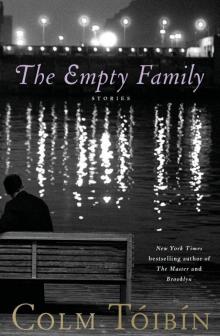 The Empty Family (v5)
The Empty Family (v5)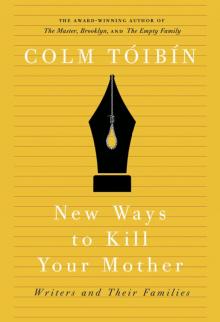 New Ways to Kill Your Mother
New Ways to Kill Your Mother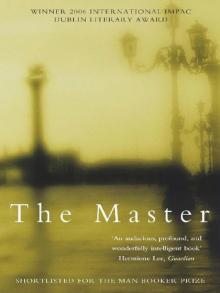 The Master
The Master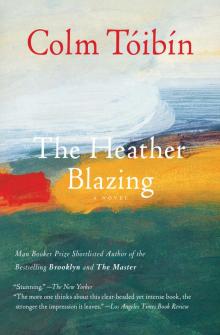 The Heather Blazing
The Heather Blazing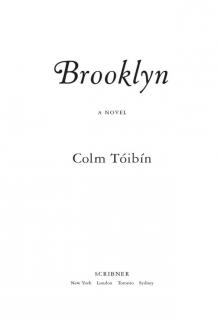 Brooklyn
Brooklyn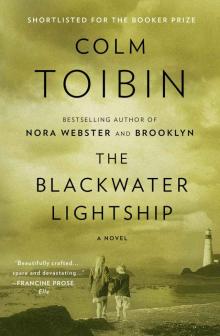 The Blackwater Lightship
The Blackwater Lightship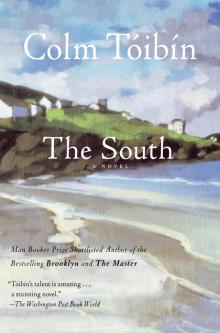 The South
The South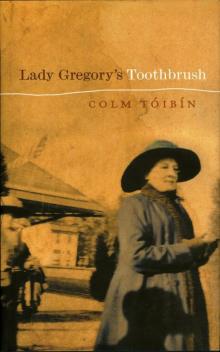 Lady Gregory's Toothbrush
Lady Gregory's Toothbrush House of Names
House of Names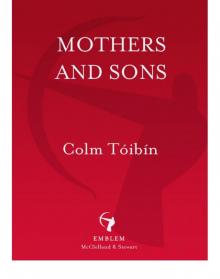 Mothers and Sons
Mothers and Sons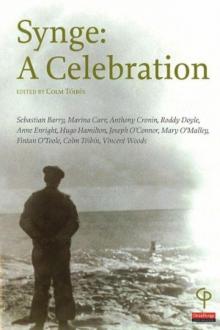 Synge
Synge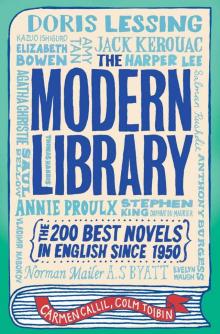 The Modern Library
The Modern Library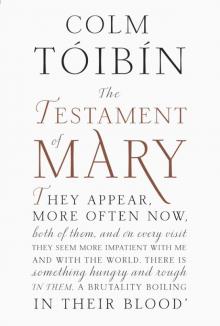 The Testament of Mary
The Testament of Mary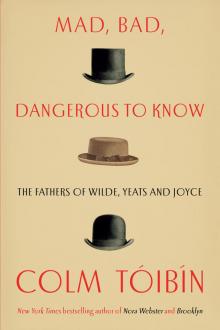 Mad, Bad, Dangerous to Know
Mad, Bad, Dangerous to Know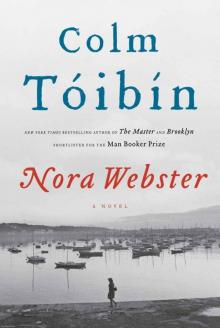 Nora Webster: A Novel
Nora Webster: A Novel